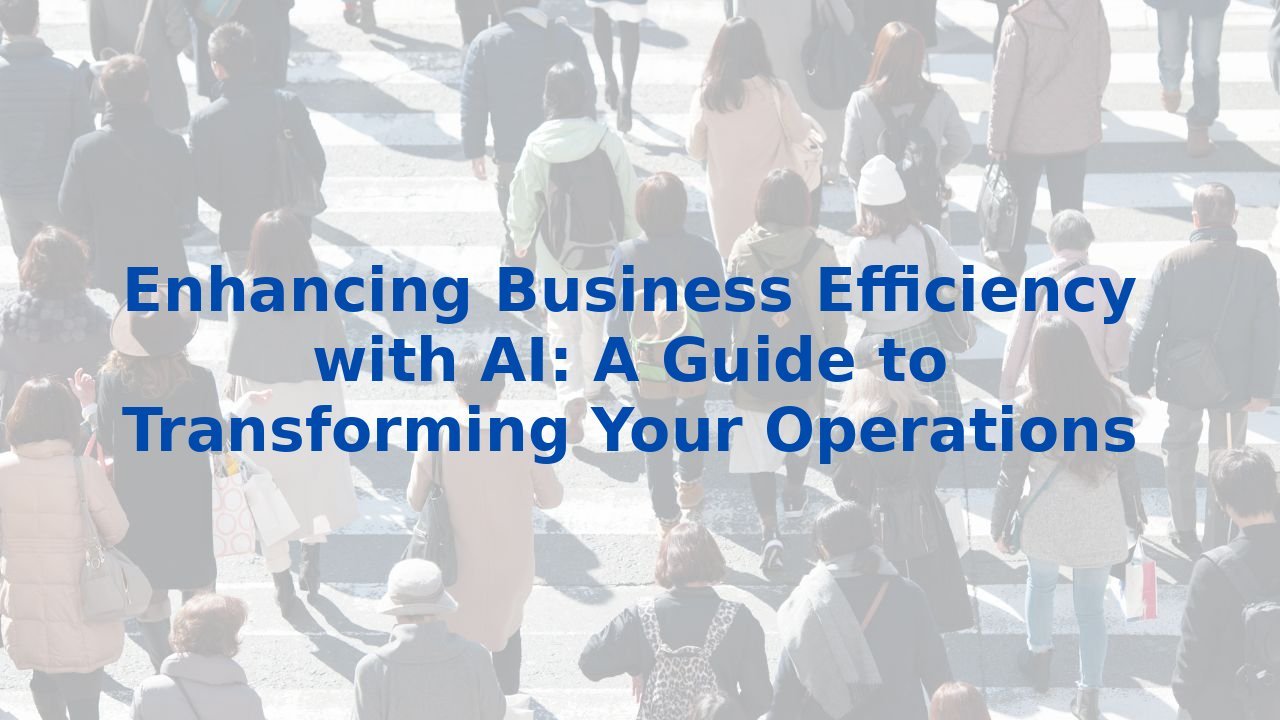Enhancing Business Efficiency with AI: A Guide to Transforming Your Operations
Enhancing Business Efficiency with AI: A Comprehensive Guide
In an age where competition thrives and expectations soar, businesses must evolve or risk obsolescence. Enter Artificial Intelligence (AI) – a transformative tool that not only promises efficiency but also revolutionizes the way we operate. By integrating AI technologies, organizations can unleash a wave of innovation, enabling their teams to focus on what truly matters. Let's explore the remarkable ways AI can enhance business processes and elevate efficiency within your organization.
1. Automating Routine Tasks
Imagine a workplace where time-consuming, monotonous tasks vanish from your to-do list. AI brings this vision to life by automating repetitive processes such as data entry, invoice processing, and appointment scheduling. By delegating these mundane responsibilities to AI-powered bots, businesses can drastically reduce human error and accelerate workflows. This not only increases productivity but also frees employees to invest their time in strategic, innovative projects that drive company growth.
2. Data Analysis and Insights
The modern business landscape is inundated with data, creating a daunting challenge for traditional analysis methods. AI shines in this realm, adeptly sifting through vast datasets to unveil valuable insights and trends. By harnessing AI-driven data analytics, organizations can make informed decisions, tailor marketing approaches, and dynamically adapt to shifting market conditions. This data-centric approach bestows businesses with a competitive edge, positioning them for sustained success.
3. Personalized Customer Experience
In today’s world, customers crave personalized interactions. AI enables businesses to understand their customer preferences and behaviors through advanced data analysis. By leveraging these insights, organizations can deliver tailored product recommendations and specific marketing messages, significantly enhancing customer satisfaction. This deeper level of engagement not only cultivates customer loyalty but fosters lasting relationships that propel businesses toward greater success.
4. Predictive Analytics
AI is not just a tool for analyzing data; it’s a powerful oracle predicting future trends. By examining historical data, AI algorithms can forecast demand patterns, refine inventory management, and optimize production schedules. This predictive power minimizes operational inefficiencies, curtails excess costs, and ensures that resources are precisely allocated where they are most needed. Thus, organizations can stay one step ahead in the ever-evolving market landscape.
5. Enhanced Marketing and Sales
Transforming traditional marketing and sales strategies is yet another way AI makes an impact. It enables businesses to glean actionable insights from customer data, facilitating data-driven decision-making. This capability allows organizations to refine their marketing efforts, targeting specific customer segments with laser precision. Furthermore, AI automates lead scoring, streamlining the sales process by identifying high-value leads and expediting their journey from prospect to customer.
6. Improved Monitoring and Quality Control
AI’s prowess in processing enormous datasets in real-time cannot be overlooked. It empowers organizations with near-instantaneous monitoring capabilities, identifying issues as they arise and even recommending actionable responses. For instance, in manufacturing, AI can enhance quality control by using sensor data to preemptively detect equipment malfunctions, drastically reducing downtime and maintenance costs.
7. Benefits of Training Employees for AI
While integrating AI offers ample rewards, it’s essential to prepare your workforce to collaborate effectively with these advanced systems. Employee training is key to unlocking AI’s full potential. By investing in training programs, organizations ensure that employees comprehend how to utilize AI tools effectively, interpret insights accurately, and make informed decisions. This not only enhances the overall efficacy of the AI systems but also fosters a culture of continuous learning and adaptation.
Conclusion
The integration of AI into business processes signals a profound shift towards efficiency, agility, and innovation. By automating routine tasks, leveraging advanced data analytics, personalizing customer interactions, and optimizing monitoring capabilities, businesses can streamline their operations and enhance decision-making. Moreover, training employees for AI is not just a beneficial add-on; it’s a necessity for flourishing in a digital-first world. As organizations continue to embrace AI’s capabilities, they are not just preparing for the future—they are setting the stage for their own sustained competitive advantage.
Success isn't just about having the right tools; it's about having the right people equipped to use those tools wisely.



